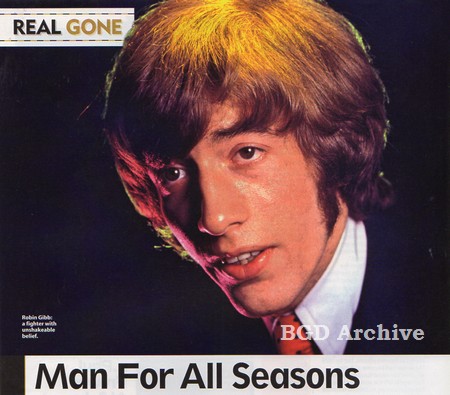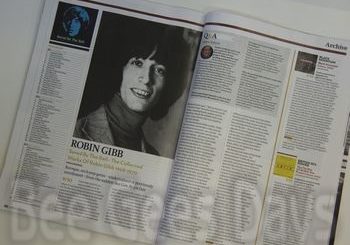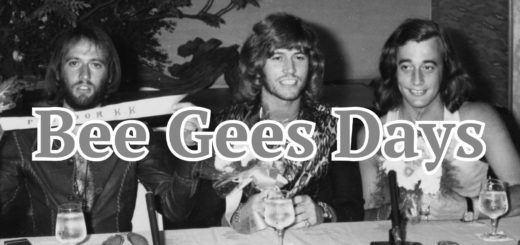【from Mojo – August 2012】”Robin Gibb – Man for All Seasons”
 |
"WE LOST ROBIN GIBB, THE SOUL OF THE BEE GEES, ON MAY 20. MARK PAYTRESS PAYS TRIBUTE" in the August 2012 issue of Mojo.
The article is titled Man For All Seasons and speaks of Robin as a "fighter with unshakeable belief" in the abilities of the Bee Gees. "Man For All Seasons" is a song from their 1970 Two Years On album, whose title was most likely taken from the title of the award-winning film about Thomas More.
The article begins:
A poster for a solo show early in 1970 declared Robin Gibb "The Voice Of the Bee Gees". The singer, who died on May 20 following a long battle with cancer, knew better. Though sometimes described as the soul of The Bee Gees, Robin understood that his ability to turn raw, often painful emotions into pop melodramas could only be fully realised as part of the delicately balanced brothers Gibb triptych. "We are creative kindred spirits," he told MOJO in 2008. "Whatever else is going on in our lives, we know instinctively what’s in our heads."
Returning to the family fold later in 1970, Robin brazenly declared that The Bee Gees "had scarcely begun" . Given that the group hadn’t had a sniff of the Top 40 in a year, many assumed he’d not recovered from the March 1969 brainstorm that saw him quit the band, and his father threaten to make him a ward of court. People worried about Robin. But beyond his sad eyes, frail frame and trembling voice wa a fighter with an unshakeable belief in the group’s abilities.
Paytress states that "That belief was built on solid foundations," because like elder brother Barry and younger twin Maurice, "Robin possessed an almost innate instinct for pop, nurtured since infancy".
In 1958 they moved from Manchester to Brisbane, where they found acclaim as child singers. Marooned between poster-boy Barry and easy-going Maurice, Robin had to dig deeper to find his role. "I don’t sing with my voice, I sing with my heart," he explained years later.
Returning to Britain in 1967, The Bee Gees broke big the following year and it was Robin’s voice, at once soulful and sentimental, that connected. After the group’s early ’70s sojourn in what Robin called the "dead zone" of cabaret, his faith, fuelled by an enormous sense of injustice, was rewarded in 1975 with global hit Jive Talkin’. It ushered in a five-year "realization of a dream," he said with pride. "We experienced record sales nobody will ever experience again."
If Robin had reigned supreme over the psych-in-suit era – his sombre, fractured vibrato on the chart-topping Massachusetts, and I’ve Gotta Get A Message To You mirroring the period’s uncertainty – the disco years were defined by Barry’s falsetto. Yet even at the height of their stand-off, early in 1969, Barry conceded that Robin had a "a far better voice". He also possessed "an incredible and wonderful imagination" said manager Robert Stigwood, who added that Robin’s ambitious title track for Odessa was "one of the finest pop songs ever written".
Asked in 2008 about his lost masterpiece, Robin was oddly dismissive. "It’s just a track from the last century," he shrugged. A man with a speaking voice that could sound uncannily like John Lennon’s, Gibb measured achievement in terms of audience reach. On those terms alone, the world of pop has lost one of hte most succcessful figures. But Robin Gibb, the distinctive voice of the early Bee Gees and a driving force for the group’s second wave of success, was so much more than that.
That Robin’s speaking voice could sound uncannily like John Lennon’s was probably meant also as a compliment. Well, I am one of those who believe that he had a voice like no other, and I loved his speaking voice sometimes even better than his singing one. While he was known for a high quavering singing voice, he spoke in a rich baritone which barely concealed the fighter for ideals and seeker of the truth residing in that delicate frame.
Robin Gibb passed on May 20, 2012 U.K. time. For those of us who live in Asia, Australia, and New Zealand, etc., he passed early in the morning of May 21. I will never forget that traumatic phone call with London. For many days afterwards, I suffered from a phobia of phone calls.
– Every day is an anniversary of missing you. (Robin Gibb – on Maurice Gibb)
{Bee Gees Days}


